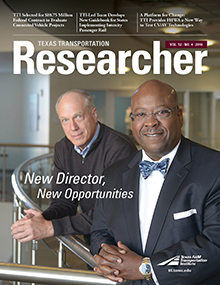The Texas A&M Transportation Institute (TTI) has been selected by the Federal Highway Administration (FHWA) to evaluate connected vehicle projects in southern Wyoming, New York City, and Tampa, Fla. The multiyear federal contract is for $10.75 million.

Vehicle challenges and opportunities have driven the need for the pilot tests and evaluations. Roadway congestion in the United States contributes to the alarming rate of crash injuries and fatalities, and a growing number of people — particularly younger people — are beginning to favor safer shared-mobility options that are more efficient, reliable and affordable. At the same time, electronic and wireless technology holds the potential to improve mobility in ways that don’t require building more roadway capacity.
These sites are deploying a wide range of connected vehicle applications and systems to improve safety, mobility, environmental and agency efficiencies in select corridors. These pilot deployments will involve both vehicle-to-vehicle and vehicle-to-infrastructure communications.
“The work we will do for FHWA will help to ensure that we’re bringing forth new solutions that take full advantage of the innovative communication technology tools that we have available to us,” says Dennis Christiansen, TTI agency director.
To advance transformative approaches, FHWA has funded efforts in two areas, each of which will be evaluated by a team led by TTI and supported by several other public- and private-sector partners:
- Connected Vehicle Pilots Deployment Program, with projects in southern Wyoming, New York City, and Tampa, Fla.
- Beyond Traffic: The Smart City Challenge, which is providing up to $40 million in funding for technology-based mobility solutions in Columbus, Ohio.
“We are extremely excited to have an opportunity to lead the evaluation effort for the CV pilot deployment sites,” says TTI Senior Research Engineer Kevin Balke, one of two project leads for the Institute. “These projects have the potential to transform the way we travel. It’s pretty cool to be on the leading edge of evaluating these deployments and to see the extent to which they can impact safety, mobility and the environment for the future.”
In addition, federal officials say, the various technologies focus on providing all Americans with safe, reliable and affordable connections to employment, education, health care and other essential services.
“Applying technology to make transportation more efficient is one of The Texas A&M University System’s top research priorities,” notes A&M System Chancellor John Sharp. “With TTI staff and the development of our new RELLIS Campus, we have both the talent and the facilities to serve as a leader in transforming the way Americans travel, and at the same time create ladders of opportunity for more Americans.”
